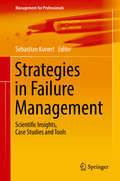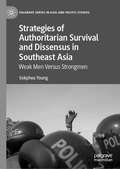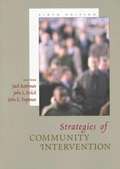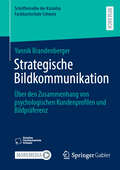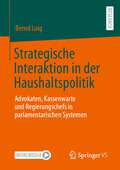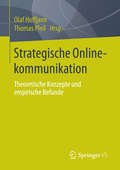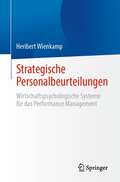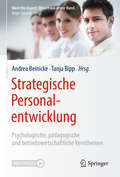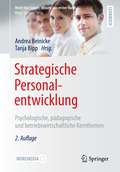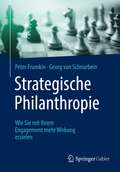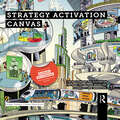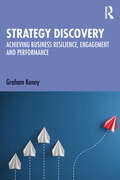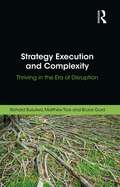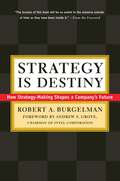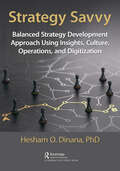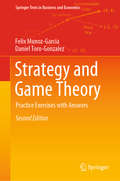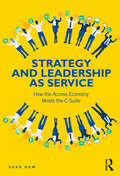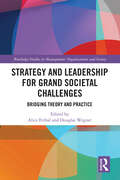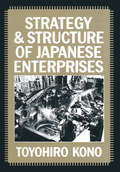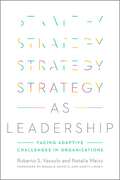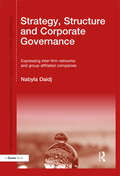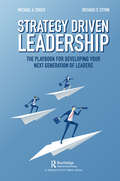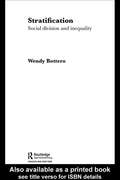- Table View
- List View
Strategies in Failure Management: Scientific Insights, Case Studies and Tools (Management for Professionals)
by Sebastian KunertThis book offers a comprehensive overview of failure in business, management and consulting. It features contributions by experts from diverse fields, who share unique insights from their real-life experiences. Readers will find perspectives from leadership, project management, change management, innovation management, human resource management, counseling, restructuring, entrepreneurship and sports. Each chapter combines the latest empirical findings with relevant case studies, making for a unique book that offers a fascinating exploration of the largely unexplored area of setbacks, pitfalls, flops and disappointments in the business world.
Strategies of Authoritarian Survival and Dissensus in Southeast Asia: Weak Men Versus Strongmen (Palgrave Series in Asia and Pacific Studies)
by Sokphea YoungThis book analyses how authoritarian rulers of Southeast Asian countries maintain their durability in office, and, in this context, explains why some movements of civil society organizations succeed while others fail to achieve their demands. It discusses the relationship between the state-society-business in the political survival context. As the first comparative analysis of strategies of regime survival across Southeast Asia, this book also provides an in-depth insight into the various opposition movements, and the behaviour of antagonistic civic and political actors in the region.
Strategies of Community Intervention (6th edition)
by Jack Rothman John L. Erlich John E. TropmanThis volume takes a broad view of community organization, viewing it as a rich and diverse field of practice that includes policy analysis and development, program planning, administration, evaluation, and resource development and allocation. The Sixth Edition emphasizes strategic and tactical considerations in community change. It treats social planning and policy initiatives, neighborhood-based citizen and empowerment approaches, and advocacy-oriented social action.
Strategische Bildkommunikation: Über den Zusammenhang von psychologischen Kundenprofilen und Bildpräferenz (Schriftenreihe der Kalaidos Fachhochschule Schweiz)
by Yannik BrandenbergerIn einer sich rasant verändernden Marketinglandschaft wird die Bedeutung einer authentischen Verbindung zwischen Unternehmen und Konsumenten immer dringlicher. Statt mit Inhalten zu überfluten, liegt die Herausforderung darin, durch gezielte visuelle Kommunikation eine tiefere Bindung aufzubauen. Diese Herausforderung wird besonders in der fehlenden Anpassung von Bildern an die psychologischen Profile der Zielgruppe deutlich, für die bisher kein empirisch validiertes Modell existiert. In diesem Buch wird ein tiefer Einblick in den Zusammenhang zwischen psychologischen Kundenprofilen und Bildpräferenzen durch die Untersuchung und Weiterentwicklung des EIC-Modells gewonnen. Die empirischen Ergebnisse, gewonnen aus einer Studie mit 95 Teilnehmenden, bestätigen diese Verbindung und eröffnen neue Perspektiven für die strategische Bildkommunikation. Als Resultat dieser Forschung präsentiert sich das ICS-Modell – ein Instrument, das Fotograf*innen und Marketingexpert*innen befähigt, die Bildkommunikation gezielt auf Zielgruppen auszurichten. Dieses Buch bietet nicht nur einen Einblick in die theoretischen Grundlagen, es regt auch dazu an, wie diese Erkenntnisse in der Praxis für eine wirkungsvolle visuelle Kommunikation genutzt werden können.
Strategische Interaktion in der Haushaltspolitik: Advokaten, Kassenwarte und Regierungschefs in parlamentarischen Systemen
by Bernd LuigIn parlamentarischen Regierungssystemen stehen bei haushaltspolitischen Konflikten auf der einen Seite die Ausgabenminister. In ihren Geschäftsbereichen spielen die Ausgaben eine merklich größere Rolle als die Einnahmen. Sie besitzen daher unabhängig vom Umweltzustand ihrer Geschäftsbereiche den Anreiz, stets ein größeres Budget einzufordern. Ihnen gegenüber stehen mit einem politikbereichsübergreifenden Interesse der Finanzminister und der Regierungschef. Während der Finanzminister üblicherweise der Rationalität des Haushaltsausgleichs folgt, orientiert sich aber letzterer vermutlich am Erfolg der gesamten Regierungsarbeit. In diesem Buch wird nunmehr das Handeln von jedem Ausgabenminister, des als Kassenwart erscheinenden Finanzministers und des Regierungschefs modelliert. Im Mittelpunkt der Arbeit steht dabei die Forschungsfrage, inwieweit die Interaktion der drei Akteure die bereichsspezifischen Ausgaben in den Budgets der deutschen Länder beeinflusst.
Strategische Onlinekommunikation
by Olaf Hoffjann Thomas PleilOnlinekommunikation und speziel Social Media sind als besonders wichtige Herausforderungen des Kommunikationsmanagements erkannt. Kaum ein Unternehmen verzichtet mittlerweile auf die Beobachtung von Diskussionen im Internet und die Umsetzung eigener Kommunikationsstrategien im Social Web. Dort verändern sich für die PR und die Organisationskommunikation zentrale Aspekte: Öffentlichkeiten können heute sehr viel schneller entstehen. Es sind neue Formen der Meinungsbildung zu beobachten, die zunehmend weniger den Mechanismen der Massenkommunikation folgen, sondern Ergebnis netzwerkartiger Prozesse sind. In diesem Umfeld entstehen gleichzeitig neue Formen der Beteiligung, die durch entsprechende niederschwellige Instrumente im Internet erst ermöglicht werden. Aus Organisationssicht verändern sich damit unter anderem Entstehung und Pflege von Reputation oder das Management von Stakeholderbeziehungen. Zehn Jahre nach Beginn der Fachdiskussion zu PR und sozialen Medien gibt dieser Band auf Basis aktueller Untersuchungen Einblick in die Praxis und in aktuelle Herausforderungen der Organisationskommunikation im Internet.
Strategische Personalbeurteilungen: Wirtschaftspsychologische Systeme für das Performance Management
by Heribert WienkampStrategische Personalbeurteilungen konzentrieren sich zum einen auf die Personen, die sich bereits im Unternehmen befinden und „Geld kosten“, zum anderen zielen sie im Rahmen des Performance Managements darauf ab, über eine Vielzahl karrierefördernder Maßnahmen die Beschäftigten nach Möglichkeit bis zum Ruhestand „bei Laune zu halten“ und an die Firma zu binden. Nur dann ist eine Amortisation aller Investitionen in die Personalentwicklung und die Erzielung einer maximalen „Bildungs-Rendite“ gewährleistet.Um die personalstrategischen Ziele zu erreichen, empfiehlt es sich, einerseits den Kommunikations- und Feedbackprozess durch eine „jobspezifische“ Mitarbeiterbeurteilung zu unterstützen und zu formalisieren, andererseits diesen Prozess der Mitarbeiterfürsorge und Beziehungspflege durch die Vorgesetzten von der Leistungshonorierung und der Karriereentwicklung als Aktivitäten des Personalmanagements zu trennen. Neben der Diskussion von sonstigen beurteilungsrelevanten Themen (z.B. Beurteilungssysteme oder Schulungen) soll auch der Frage nachgegangen werden, wie dem „Lernen und Entwickeln“ aus der Balance Score Card durch Mitarbeiterfeedback im Rahmen der Personalbeurteilung bei der Strategieumsetzung und Unternehmensentwicklung geholfen werden kann. Zum Inhalt Strategiebewertung mit Hilfe der Rückmeldung aus den Beurteilungsgesprächen,Vor- und Nachteile einer Differenzierung zwischen Mitarbeiter-Feedback bezogen auf die aktuelle Tätigkeit und karrierefördernden Maßnahmen, „Lernen und Entwickeln“ aus der Perspektive der Balance Score Card (BSC), Strategieumsetzung und Strategiebewertung, Details zum Beurteilungsgespräch und die Bedeutung der Selbstbeurteilung als Vorbereitung auf die Mitarbeiterbeurteilung …und vieles mehr.
Strategische Personalentwicklung: Psychologische, Pädagogische Und Betriebswirtschaftliche Kernthemen (Meet The Expert: Wissen Aus Erster Hand Ser.)
by Andrea Beinicke Tanja BippIn diesem Buch beantworten führende Expertinnen und Experten aus den Bereichen der Psychologie, Erwachsenenbildung und Betriebswirtschaftslehre praxisbezogene relevante Fragen zur Thematik der beruflichen Weiterbildung in der heutigen Arbeitswelt. Sie erfahren mehr zum Thema Personalentwicklung im Wandel der Zeit, verschiedene Weiterbildungssettings und wie Weiterbildungsserfolge sichergestellt werden können. Sie erhalten auch wissenschaftlich fundierte Erkenntnisse über Coaching und Mentoring und weitere Kernthemen wie: - Wie wirkt sich die alternde Arbeitsgesellschaft auf die betriebliche Weiterbildung aus?- Wie stellt man den Erfolg von Trainingsmaßnahmen im Arbeitsalltag sicher, so dass sich Investitionen in solche Maßnahmen lohnen? - Wie können Führungskräfte ihre Mitarbeitenden dazu befähigen, notwendige Kompetenzen für das heutige und zukünftige Arbeitsleben zu entwickeln? - Ist Coaching von Mitarbeitenden effektiv oder können auch negative Effekte auftreten?Dieses Buch richtet sich an Professionals aus der Praxis, die im Bereich Human Resource Development tätig sind wie Personalverantwortliche, Personalentwickler, Personalleiter sowie Mitarbeitende aus Weiterbildungseinrichtungen. Aber auch Studierende, Lehrende, und Wissenschaftler und alle, die Interesse haben, sich mit aktuellen und zukunftsweisenden Fragen der Personalentwicklung zu beschäftigen, sind zur Lektüre eingeladen.
Strategische Personalentwicklung: Psychologische, pädagogische und betriebswirtschaftliche Kernthemen (Meet the Expert: Wissen aus erster Hand)
by Andrea Beinicke Tanja BippIn diesem Buch beantworten führende Expertinnen und Experten aus den Bereichen der Psychologie, Erwachsenenbildung und Betriebswirtschaftslehre praxisbezogene relevante Fragen zur Thematik der beruflichen Weiterbildung in der heutigen Arbeitswelt.Sie erfahren mehr zum Thema Personalentwicklung im Wandel der Zeit, verschiedene Weiterbildungssettings und wie Weiterbildungsserfolge sichergestellt werden können. Sie erhalten auch wissenschaftlich fundierte Erkenntnisse über Coaching und Mentoring und weitere Kernthemen wie:Wie wirkt sich die alternde Arbeitsgesellschaft auf die betriebliche Weiterbildung aus?Wie stellt man den Erfolg von Trainingsmaßnahmen im Arbeitsalltag sicher?Wie können Führungskräfte ihre Mitarbeitenden dazu befähigen, notwendige Kompetenzen für das heutige und zukünftige Arbeitsleben zu entwickeln?Ist Coaching von Mitarbeitern effektiv oder können negative Effekte auftreten?Dieses Buch richtet sich an Professionals aus der Praxis, die im Bereich Human Resource Development tätig sind wie Personalverantwortliche, Personalentwickler, Personalleiter sowie Mitarbeitende aus Weiterbildungseinrichtungen. Aber auch Studierende, Lehrende, und Wissenschaftler und alle, die Interesse haben, sich mit aktuellen und zukunftsweisenden Fragen der Personalentwicklung zu beschäftigen, sind zur Lektüre eingeladen.
Strategische Philanthropie: Wie Sie mit Ihrem Engagement mehr Wirkung erzielen
by Peter Frumkin Georg von SchnurbeinVor dem Hintergrund globaler Herausforderungen an den Finanzmärkten und beschränkte öffentlicher Haushaltsbudgets ist die Fähigkeit von privater Philanthropie, Lücken zu füllen, von besonderer Bedeutung. Unterstützung für gesellschaftliche Probleme, die Finanzierung innovativer Projekte oder die Entwicklung alternativer Angebote bieten vielfältige Möglichkeiten, sich für die Gesellschaft zu engagieren. Aber wie können Philanthropen und Spender Gewissheit haben, dass ihre Beiträge auch eine Wirkung erzielen? Wie können Fundraiser überzeugend und nachvollziehbar ihr Projekt präsentieren? Dieses Buch bietet allen in der Philanthropie involvierten Akteuren - von Philanthropen über Fundraisier bis hin zu Nonprofit Managern - einen praktischen und kompakten Leitfaden zur wirkungsorientierten Umsetzung. Die Autoren definieren fünf Herausforderungen, die zu berücksichtigen sind, wenn ein Engagement mehr als eine flüchtige Spende sein soll. Dazu zählen der zeitliche Umfang des Engagements, die Formulierung der erwünschten Wirkung und die Übereinstimmung der Spende mit der eigenen Identität und dem eigenen Stil des Gebenden. Die Berücksichtigung dieser grundsätzlichen, strategischen Aspekte des Gebens erlaubt es Philanthropen, ihre Ziele effektiver zu erreichen - und eine dauerhafte Beziehung mit den unterstützten Institutionen und Destinatären aufzubauen. Gerade für die nächste Generation von Philanthropen, die vor der Herausforderung stehen, effektiv zu verteilen, was Andrew Carnegie den “Überschuss-Reichtum" genannt hat, ist dieses Buch eine unverzichtbare Anleitung mit praktischen Fallbeispielen, Empfehlungen und Methoden.
Strategy Activation Canvas
by Robert Wreschniok Ansgar ThiessenThe Strategy Activation Canvas is the new standard for accelerating strategies – beginning where classical strategies end: with its activation. While many management and business canvases focus on developing a strategy, the Strategy Activation Canvas helps leaders and decision-makers to bring strategies to life. This book demonstrates for the first time how entire organizations can be “activated”: how people can not only perceive and implement a new strategy, but how entire organizations can be heavily involved in its making, how strategies are made visible and experienced, and how people can play an active and sustaining role throughout bringing a strategy to life. With their decades of experience in large scale organizations, Thiessen and Wreschniok pair their knowledge with case studies from Allianz, Baloise, E.ON, Hamburg Commercial Bank, Microsoft, NORD/LB, Swisscom or Swiss Re, shared by leaders who have remarkably accelerated the success and value of their strategies on the back of strategy activation. This book is an essential resource for managers who have responsibility for strategic initiatives and transformation programs of any kind.
Strategy Discovery: Achieving Business Resilience, Engagement and Performance
by Graham KennyPersonal, useful, actionable and grounded in research, this book will shift your thinking from "strategy development" to "strategy discovery" to enable you to deal with today’s business challenges, engage your staff and boost your business performance. Management teams and boards are facing disruption on all sides, from morphing customer preferences to the COVID pandemic to climate change. At the same time they are floundering in strategy confusion with too many concepts and not enough clarity. In this book, strategy expert and regular Harvard Business Review author Graham Kenny releases managers and directors from their strategy haze. His simple and effective framework allows managers to navigate the current maze of ideas and approaches and maximize their competitive advantage. Kenny’s readable style is equally effective: each chapter begins with an engaging story, then builds on this with cases, client examples, sidebars and more, ending with a series of action points to provide a pathway to success. CEOs, senior-level and middle managers across all functions and sectors, including private, public and not-for-profit organizations, who discuss and set strategy for their organization or business unit will appreciate the articulated framework, illustrative anecdotes and positive encouragement this book offers.
Strategy Discovery: Achieving Business Resilience, Engagement and Performance
by Graham KennyPersonal, useful, actionable and grounded in research, this book will shift your thinking from "strategy development" to "strategy discovery" to enable you to deal with today’s business challenges, engage your staff and boost your business performance. Management teams and boards are facing disruption on all sides, from morphing customer preferences to the COVID pandemic to climate change. At the same time they are floundering in strategy confusion with too many concepts and not enough clarity. In this book, strategy expert and regular Harvard Business Review author Graham Kenny releases managers and directors from their strategy haze. His simple and effective framework allows managers to navigate the current maze of ideas and approaches and maximize their competitive advantage. Kenny’s readable style is equally effective: each chapter begins with an engaging story, then builds on this with cases, client examples, sidebars and more, ending with a series of action points to provide a pathway to success. CEOs, senior-level and middle managers across all functions and sectors, including private, public and not-for-profit organizations, who discuss and set strategy for their organization or business unit will appreciate the articulated framework, illustrative anecdotes and positive encouragement this book offers.
Strategy Execution and Complexity: Thriving in the Era of Disruption
by Richard Busulwa Matthew Tice Bruce GurdAlmost all organisations today face unprecedented levels of change, complexity and volatility. Navigating the resultant disruption dynamics is one of the most important stewardship challenges facing strategic leaders. Getting it right can pay enormous dividends, but getting it wrong can lead to spectacular failure and the ultimate demise of once admired organisations. To address this threat, strategic leaders need to better understand how to navigate complexity and volatility and how to execute strategy in this rapidly changing environment. This book identifies 12 different strategy execution processes used to realise deliberate and emergent strategies – each illustrated with case studies and essential lessons for strategic leaders. The authors then discuss the effectiveness of these processes in different types of complex environments, showing how, used in isolation, each process can, at times, impede performance, sometimes creating survival risks that materialise today or in the future. The authors show the importance of "ambidexterity" and the need for organisations to balance the pursuit of internal efficiency and external market flexibility, both of which are essential to thriving in complex environments. This book provides essential tools for leaders to rethink and reconfigure their strategy execution practices in light of the significant change surrounding their organisations. The book is based on a 5-year, multistage study comprehensively reviewing cutting-edge research on strategy execution, reviewing seminal texts on strategy execution and, through in-depth case study interviews and cross-sectional surveys, identifying contemporary strategy execution practices of a range of different organisations across industries and sectors.
Strategy Is Destiny: How Strategy-Making Shapes a Company's Future
by Robert A. BurgelmanHow did a pioneering company in the semiconductor industry not only survive but thrive in the face of the explosive change and upheavals that forced it to transform itself twice in the course of its thirty-year history? The answer lies in the quality of its strategy-making process, contends leading strategic management scholar Robert A. Burgelman in this extraordinary book based on an exhaustive twelve-year study he conducted inside Intel Corporation. Granted the opportunity to track Intel's strategy-making through his close teaching collaboration with its chairman, Andy Grove, at Stanford Business School since 1988, Burgelman has written a definitive and far-reaching account of how highly educated top managers groped their way through strategic conundrums. His account of the evolution of key events in Intel's history is illustrated with extensive quotes from its cofounder Gordon Moore, Andy Grove, current CEO Craig Barrett, and dozens of other Intel executives. His study allows these leaders to speak for themselves in scores of highly rendered executive portraits. Using thoroughly tested conceptual tools, Burgelman first documents the key role played by mid-level managers in transforming Intel from a memory company into a microprocessor company during the late 1970s and early 1980s, which led to the heartbreaking decision to abandon the business on which the company had been founded in 1968. He then makes readers eyewitnesses to the complex set of complementary strategic thrusts orchestrated by Andy Grove to make Intel capi- talize on the extraordinary opportunities associated with the phenomenal growth of the PC industry during the late 1980s and the 1990s. He reconstructs Grove's resolution of the struggle between two competing micro- processor architectures within Intel that caused civil war to erupt, and he shows how Intel's superbly run strategy-making process in the core business, paradoxically, made it difficult for internal entrepreneurs to extend the company's strategic reach. This allows him to link the strategic leadership challenges, faced today by Craig Barrett, to Intel's illustrious past and to provide suggestions for how these challenges can be met. At once a history of strategy-making at Intel as well as a strategy-making field manual that any high-technology manager will need to consult frequently, Strategy Is Destiny truly describes strategy-in-action as the way of life of senior executives in the corporation of the future.
Strategy Savvy: Balanced Strategy Development Approach Using Insights, Culture, Operations, and Digitization
by Hesham O. DinanaWith the COVID-19 pandemic, many business leaders question the need for strategy and the value of strategic planning and management in today’s environment. This book will demonstrate that our approach to strategy development and implementation needs to change to be able to help organizations change. The proposed new approach in this book can provide insights and perspectives to keep strategy relevant by "Putting Strategy in Action" through developing a "Making the Future Happen Today" way of thinking and living. Many strategy books focus on the perspective of large multinational corporations that have the capacity and capabilities to develop and implement a strategy using very structured methodologies and tools. This book will add a new dimension by focusing on the use of Strategy-as-Practice (SaP), intuition, and serendipity as important complements that can be used by large corporations as well as small- and medium-sized enterprises (SMEs) and entrepreneurs to develop and implement winning strategies. This is an important dimension to support the strategic decision-making process that is frequently undermined in traditional strategic planning and management-focused books. The author theorizes that developing into a Strategy Savvy professional is about embracing two of the most important concepts in strategy development—Proactivity and Sustainability. This book addresses the opportunities and threats presented by VUCA (Volatility, Uncertainty, Complexity, and Ambiguity) and how we can capitalize on those opportunities to create unprecedented growth opportunities in Society 5.0 that is shaping new economies, such as the Digital Economy, the Experience Economy, the Sharing Economy, the GIG Economy, the Purpose Economy and the Circular Economy. The author also proposes a new approach to strategy development and implementation that mixes formal planning with practice and intuition that is helped by serendipity. He presents a strategy that is driven by four propellers—insights, culture, operations, and digitization—to ensure arrival at a better future.
Strategy and Game Theory: Practice Exercises with Answers (Springer Texts in Business and Economics)
by Felix Munoz-Garcia Daniel Toro-GonzalezThis textbook presents worked-out exercises on game theory with detailed step-by-step explanations. While most textbooks on game theory focus on theoretical results, this book focuses on providing practical examples in which students can learn to systematically apply theoretical solution concepts to different fields of economics and business. The text initially presents games that are required in most courses at the undergraduate level and gradually advances to more challenging games appropriate for graduate level courses. The first six chapters cover complete-information games, separately analyzing simultaneous-move and sequential-move games, with applications in industrial economics, law, and regulation. Subsequent chapters dedicate special attention to incomplete information games, such as signaling games, cheap talk games, and equilibrium refinements, emphasizing common steps and including graphical illustrations to focus students’ attention on the most relevant payoff comparisons at each point of the analysis. In addition, exercises are ranked according to their difficulty, with a letter (A-C) next to the exercise number. This allows students to pace their studies and instructors to structure their classes accordingly. By providing detailed worked-out examples, this text gives students at various levels the tools they need to apply the tenets of game theory in many fields of business and economics. The second edition of the text has been revised to provide additional exercises at the introductory and intermediate level, expanding the scope of the book to be appropriate for upper undergraduate students looking to improve their understanding of the subject. The second edition also includes a new chapter devoted entirely to cheap talk games. Revised to appeal to a larger audience of instructors and students, this text is appropriate for introductory-to-intermediate courses in game theory at the upper undergraduate and graduate levels.
Strategy and Leadership as Service: How the Access Economy Meets the C-Suite
by Sara DawStrategy and Leadership as Service isn’t just a nice idea; it is a practical, alternative vision of the future of work for senior executives that is starting to gain significant interest and is being adopted by businesses globally. Disrupting and challenging the traditional full-time employment model, the Strategy and Leadership as Service framework provides businesses with access to the complete range of functional, emotional, and collective intelligence at the C-suite level by moving their positions from the “pay-roll” to an “access-role.”Many entrepreneurial and growing businesses don’t need, don’t want, and can’t afford full-time C-suite executives. For larger organisations, it is becoming harder to find the skills and knowledge required to fulfil all the obligations of a functional C-suite with a fixed group of individuals. By moving to the Strategy and Leadership as Service framework, the outcomes are better for all stakeholders: more engagement, access to the right skillsets and mindsets at the right time and in the right quantity to match the changing business agenda, more flexibility for senior leaders, and strengthened risk management. Through presenting a working business model, and real-world case studies throughout, this book provides executives and leaders with a complete understanding of this ground-breaking approach and its key benefits, the theory upon which it is based, its essential ingredients, the mindset change required and, most importantly, how to apply it in practice.The book provides business leaders, C-suite portfolio executives, human resource professionals, strategy consultants, leadership coaches, organisational development consultants, recruiters, professional service firms, academics, and forward-thinking business students with a radical new view of how the access economy can be applied to business strategy and leadership for more sustainable futures.
Strategy and Leadership for Grand Societal Challenges: Bridging Theory and Practice (Routledge Studies in Management, Organizations and Society)
by Alice Erthal Douglas WegnerStrategy and Leadership for Grand Societal Challenges: Bridging Theory and Practice offers a thorough examination of grand challenges (GCs), addressing the origins and impacts of these global issues while outlining practical solutions. Through a blend of theoretical exploration and real-world case studies, this book reveals how businesses, governments, and organizations can strategically approach GCs to foster societal progress. It presents a toolkit for addressing GCs, focusing on key areas like multi-stakeholder collaboration, innovative business models, and responsible innovation. Readers will gain insights into ethical and transformative leadership and the importance of open strategizing, which prioritizes transparency, inclusivity, and socially aligned decision-making. Practical guidance and theoretical frameworks equip leaders to navigate the complex and sometimes paradoxical aspects of GCs, helping them drive meaningful, sustainable impact. This book is essential reading for academics, researchers, and advanced students in the fields of business management, leadership studies, and public policy, especially those focused on addressing complex societal issues through strategic frameworks. It also offers valuable insights for scholars investigating the intersections of ethics, responsible innovation, and multi-stakeholder collaboration. While practitioners and policymakers may find actionable strategies within its pages, scholars and professionals alike will benefit from its rigorous theoretical foundation and empirical case studies.
Strategy and Structure of Japanese Enterprises
by Toyohiro KonoComposed of a series of 12 articles, this work analyzes China's rural reforms. The articles cover such topics as the responsibility system, privatization, industrialization, social conflict, urban-rural relations and rural urbanization.
Strategy as Leadership: Facing Adaptive Challenges in Organizations
by Roberto S. Vassolo Natalia WeiszStrategy as Leadership is about making sense of predictable but drastic changes that can alter the relationship between businesses and their competition, posing substantial leadership challenges to senior management teams. Roberto S. Vassolo and Natalia Weisz provide a framework to address and respond to these critical changes by identifying them, describing the inner tensions these changes generate, and providing guidance for their successful navigation. This outside-in approach specifies the salient leadership challenges that executives will face while mobilizing their organizations to respond effectively to competitive and environmental change. This book claims that strategy is leadership as, in this framework, these environmental changes demand shifts in strategic priorities that result in a consistent pattern of resistance. If we know that changes are occurring in the competitive environment, we can soon identify who will be most resistant to the shift in priorities necessary to address the new situation. This book is for senior management teams to enable their organizations' capabilities to adapt and address environmental changes successfully.
Strategy for Labor: A Radical Proposal
by André GorzThe wave of labor struggles that ensued was (and still is) an unprecedented experiment in collective self-education. It may be worth noting that some of the leading theoreticians in this experiment drew some inspiration from the struggles waged by the American working class in the last thirty-five years. What is at work in experiments like these is more than just labor tactics or the instant improvement of the worker's lot. What is at work is the establishment of an industrial democracy adapted to conditions in which representative democracy reveals more clearly than ever its inherent limitations. Labor unions and labor action are seen as one of the main instruments (democratic political parties with an overall vision being another prerequisite) for the conquest of popular centers of power and the democratic self-rule from below, on which democracy will have to rest if it is to survive or to be reborn. It will be able to do neither if basic issues remain beyond the reach of those who are most directly concerned by them.
Strategy, Structure and Corporate Governance: Expressing inter-firm networks and group-affiliated companies (Finance, Governance and Sustainability)
by Nabyla DaidjSince the beginning of the 2000s, important changes in external environments have affected the corporate governance practices of firms all around the world. The corporate governance structure in each country develops in response to country-specific factors and conditions. Firms are currently engaged in a variety of dynamic business relationships such as business networks, strategic alliances, and conglomerates especially in high technology sectors. Strategy, Structure and Corporate Governance by Nabyla Daidj, proposes to analyze the main trends and drivers of change in corporate governance of several kinds of organizations: - Large conglomerates. The development of large and complex conglomerate organizations have played an important role in the economy in Japan but also in other countries such as Korea with chaebols, which can be defined as closely intertwined industrial groupings. - Inter-firms networks (districts, clusters etc.); and, - 'Recent' forms of inter-firms networks (business ecosystems). The author examines several case studies and shows how shifts in markets and global competition are reconfiguring transactions within these organizations and are impacting corporate governance systems.
Strategy-Driven Leadership: The Playbook for Developing Your Next Generation of Leaders
by Michael A. Couch Richard S. CitrinIt’s estimated that U.S. companies spend over $14 billion annually on leadership development --Match that number to the abundant and growing research that finds most leadership development to be ineffective, and the conclusion is a phenomenal amount of waste. The remedy for this situation is to have business strategy drive leadership development instead of creating programs that match a one-size-fits-all approach to leadership. This book's approach, called Strategy-Driven Leadership Development (SDLD), puts business strategy first. It maintains an emphasis on building leadership programs around what it will take to make the business successful as opposed to implementing a program in the hopes that it will benefit the strategy. The result is a differentiated and targeted approach called Intentional Leadership Development, which provides the structure for transforming how leadership development is undertaken. At the heart of this book, however, is the explanation of how small, incremental changes in action and perspective create meaningful changes in the way leadership is developed. The focus is on the leadership behaviors associated with success for any company. Some companies may need leaders with better financial acumen while others may require better teamwork for success. These skills are learnable and when the energy of an organization is behind it, then leadership development can be transformational. The authors method "retools" prior leadership efforts – the emphasis is not on previous failures and restarting with new programs. There are many effective ideas and actions that are currently embedded in leadership programs, but they miss the critical element of tying their efforts to the business strategy. Strategy-Driven Leadership changes the way organizations think about and drive their leadership talent initiatives among their current and upcoming leaders. The book is filled with research, science-based information, case studies, and practical hands-on tools on why and how this Strategy-Driven Leadership Development model will transform company leadership approaches.
Stratification: Social Division and Inequality
by Wendy BotteroOffering a fresh and exciting new perspective on differentiation and inequality, this absorbing book investigates how our most personal choices (of sexual partners, friends, consumption items and lifestyle) are influenced by hierarchy and social difference. Exploring the topics of assortative mating; social capital; friendship networks and cultural identity; the book examines how hierarchy affects our tastes and leisure time activities, and who we choose (and hang on to) as our friends and partners. This book: * introduces debates on stratification by exploring its effect on everyday social relations* relates class inequalities to broader processes of social division and cultural differentiation, exploring the associational and cultural aspects of hierarchy* explores how groups draw on social, economic and cultural resources, using cultural 'cues', to admit some and exclude others from their social circle* explores new theoretical approaches to stratification: drawing on cultural theories of class, social interaction approaches, and research on differential association The book has a novel and fresh new way of looking at a well-established area in sociology - social stratification.
